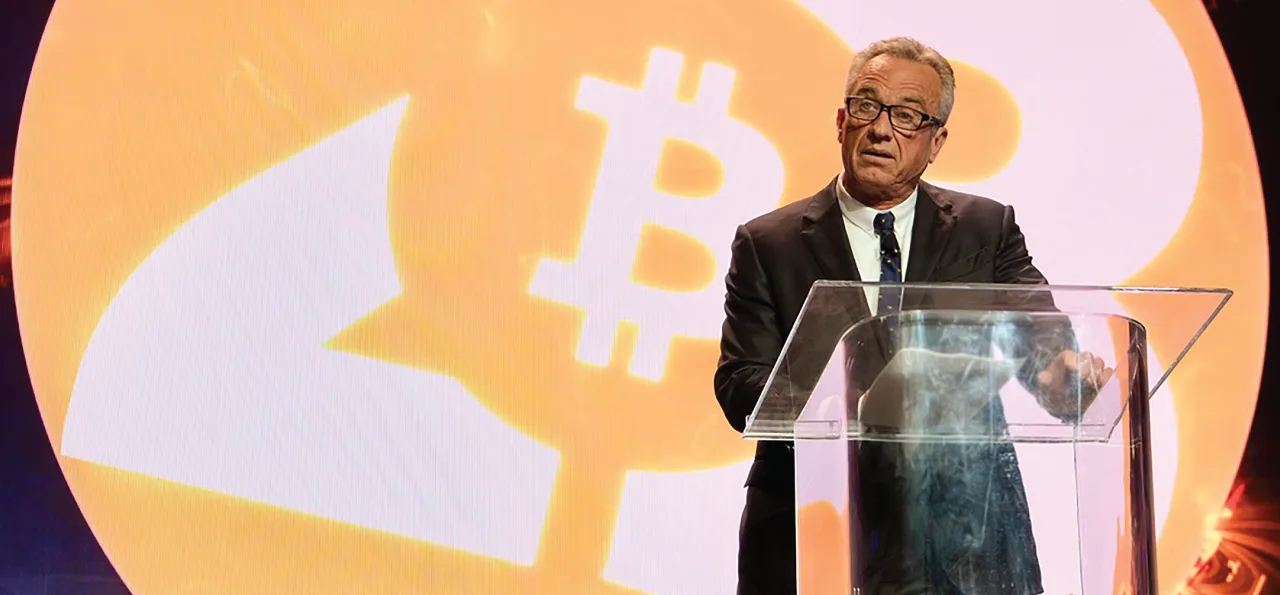Democratic Presidential Candidate Robert F. Kennedy Jr. articulated specific Bitcoin-focused policies, including backing the U.S. dollar with bitcoin, at a recent campaign event.
Speaking at a Heal-the-Divide PAC event, Democratic Presidential Candidate Robert F. Kennedy Jr. outlined specific Bitcoin-focused policies that he would enact as president, including gradually backing the U.S. dollar with bitcoin and making bitcoin profits exempt from capital gains taxes.
“My plan would be to start very, very small, perhaps 1% of issued T-bills would be backed by hard currency, by gold, silver platinum or bitcoin,” Kennedy said, describing his vision for returning to a hard currency standard in the U.S.
He added that, depending on the outcome of that initial step, he would increase that allocation annually.
This potential policy reimagines the financial system, pointing to a future where bitcoin’s absolute scarcity and sound monetary principles reinforce the U.S. dollar’s eroding position as the world reserve currency.
“Backing dollars and U.S. debt obligations with hard assets could help restore strength back to the dollar, rein in inflation and usher in a new era of American financial stability, peace and prosperity,” he declared.
In addition, Kennedy announced his administration “will exempt the conversion of bitcoin to the U.S. dollar from capital gains taxes.”
“The benefits include facilitating innovation and spurring investment, ensuring citizen privacy, incentivizing ventures to grow their business and tech jobs in the United States rather than in Singapore, Switzerland, Germany and Portugal,” he added. “Non-taxable events are unreportable and that means it will be more difficult for governments to weaponize currency against free speech, which as many of you know, is one of my principal objectives.”
During his announcement, Kennedy reiterated the slew of commitments he made to foster Bitcoin adoption during a speech at the Bitcoin 2023 conference in May, which included “defending the right of self custody of bitcoin,” upholding “the right to run a node at home” and defending “industry-neutral regulation of energy.”
Kennedy framed his commitments to Bitcoin as integral to the ideals of his uncle, President John F. Kennedy, and his own vision for governing a free and equitable country.
“My uncle, President Kennedy, when he was in office, understood the importance of hard currency and the dangers of having pure fiat currency with no other option,” Kennedy said. “He understood the relationship between fiat currency and war, fiat currency and … very, very destructive environmental projects and also these giant aggregations of wealth and the unbalance, the disparities in wealth that are the ultimate yield of every fiat currency.”
Reflecting on the history of fiat currencies, Kennedy didn’t mince words, citing the frequent use of unbacked paper currency to fund wars without the need for specific government taxation or citizens’ approval.
“Fiat currency was invented to fund wars,” he said. “I like base currencies because they make it more difficult, you have to go to the public. You can’t just print money to fund the war and tax the public through the hidden tax of inflation. You actually have to go to the public and say, ‘Here’s what this war is going to cost.’”
He emphasized his regulatory outlook that “bitcoin is not a security and should not be regulated as one” and his commitment to “put an end to the current policies of the Biden administration that are invited by Choke Point 2.0 to punish banks that are dealing with bitcoin.”
Reflecting on the broader implications of these policies, Kennedy alluded to the financial circumstances that currently face the United States. A steady growth rate of 6.5% in national debt over the past decade makes the case for forward-looking and comprehensive fiscal strategies from the highest office. Against this backdrop, Kennedy’s proposal for the U.S. Treasury to acquire assets such as bitcoin and precious metals is an approach that’s meant to offer an insurance policy against the country’s mounting debt.
Kennedy’s steadfast conviction in Bitcoin signals a coming political paradigm shift, where bitcoin is seen not just as an asset, but as a prudent policy tool to ensure the nation’s fiscal longevity and an opportunity to attract intellectual capital to U.S. shores.



